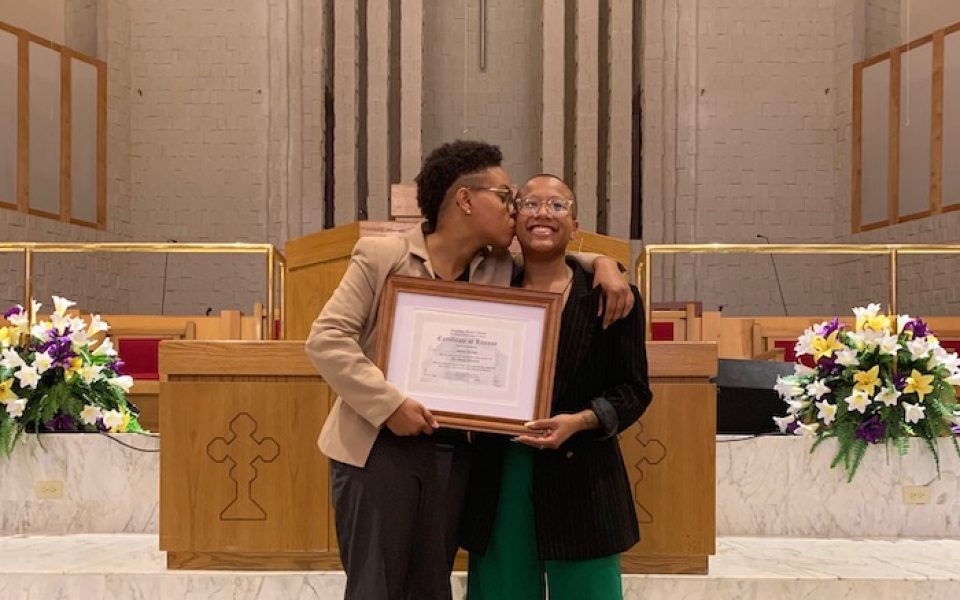J Vu Mai made history at the beginning of June by becoming one of the first black, transgender, non-binary ministers of the Christian gospel in the North Carolina. Mai, who is also part Vietnamese, is a rising second year student at the Wake Forest University School of Divinity and was licensed by the Rev. John Mendez of Emmanuel Baptist Church in Winston-Salem. Mai anticipates receiving their master of divinity degree in 2021 and currently works as a graduate assistant the Wake Forest University’s LGBTQ Center. Mai uses they/them pronouns.
1. Congratulations! What does it mean to you to become one of the first black, transgender ministers in North Carolina?
It means a lot, and it also means little to me. It means a lot
in the sense that there already exists black, trans, non-binary ministers in
the state but, because of barriers to get licensed; in the black church, I’m
one of the first. Hopefully this helps them become publicly acknowledged by
their church, by the state and by their community.
2. When and why did you decide to become a minister?
I decided to become a minister because of a discussion in one of
my divinity classes. It was essentially that at the end of the day, ministers
have the say. We can talk about what’s good theology but at the end of the day,
pastors have the ultimate authority. I was like, Fine. Imma be licensed or
ordained. I also grew up Vietnamese Roman Catholic but was agnostic and
low-key atheist all through college. What brought me back to faith was falling
in love with my partner, who is ordained as a minister. She showed me that God
and faith is much bigger than what violent people have to say about the faith.
I also met a lot of black, trans, queer people in their spiritual journeys, and
I recognized that I was worthy of and deserved healing.
3. What are the kinds of barriers that you talk about to getting licensed as a black, trans, non-binary person?
People feeling comfortable exploiting the labor — emotional,
spiritual, mental — of black trans non-binary people. [The church] wants that
person to do all the work of being minister without them having the systemic
acknowledgement of being a minister. For a long time, being licensed or
ordained has been a barrier. I want to make sure other people are legit and
official. I’m not trying to be more legit; I’m trying to say that anyone can be
legit.
This has a lot to do with the church I’m at too. Maybe at
another church I wouldn’t have gotten ordained. That is a huge component as to
why I was licensed, because of Rev. Mendez. He was like, “Yeah, let’s do it.”
It’s because of folks who are willing to take a chance on trans, non-binary
folks within the black church. I also have access; my hope is to create more
access for people.
4. How does your identity, particularly you being transgender and non-binary, affect your faith and your practice?
I identify as somewhat Christian but also somewhat agnostic. I
perceive the binary between Christian or not Christian like I perceive gender
to be a false binary. There are so many nuances of what it means to be
Christian, what it means to be a non-binary Christian. There is a fluidity to
it, just like there is a fluidity to my gender. Those boundaries and categories
that we place ourselves in per religion is damaging and limiting for someone
that exists outside of the binary like me. That impacts my faith practice
because I’ve made a commitment to minister to all people. God doesn’t have a
binaristic way of perceiving God’s ministry. I’m always striving to deconstruct
those categories.
5. What do you hope to preach and practice now that you are a minister?
My initial sermon was about how God speaks in many native
tongues. That includes transgender, non-binary queer people, even though our
experiences have been placed on the margins. I also hope to preach trauma-informed
messaging, especially for black folks, preaching about liberation from
generational trauma. I hope to preach that people are worthy, that they’re
enough and have the capacity to be fully loved the way they deserve to be
loved, not the way society has told them they deserve to be loved which is very
minimal.
6. What would you tell members of the LGBTQ+ community who are wary of religions, especially Christianity because of the hateful rhetoric that comes out of the faith at times?
I would tell them that they have right to be wary of that. As
someone who has experienced spiritual violence from Christianity, whatever
journey they take through healing is a valid journey — it’s part of the
Christian journey. Even if you are wary and don’t feel like you connect, you
are a valid voice. I want [them] to know that people like me are willing to sit
in that tension and be present with [them], especially because of how [they]
feel about religion. Christian ministers, in particular, are obligated to
extend to people who have been harmed by religion deeply.
Join the First Amendment Society, a membership that goes directly to funding TCB‘s newsroom.
We believe that reporting can save the world.
The TCB First Amendment Society recognizes the vital role of a free, unfettered press with a bundling of local experiences designed to build community, and unique engagements with our newsroom that will help you understand, and shape, local journalism’s critical role in uplifting the people in our cities.
All revenue goes directly into the newsroom as reporters’ salaries and freelance commissions.


It is a shame that someone so filled with hate is actually in monistry